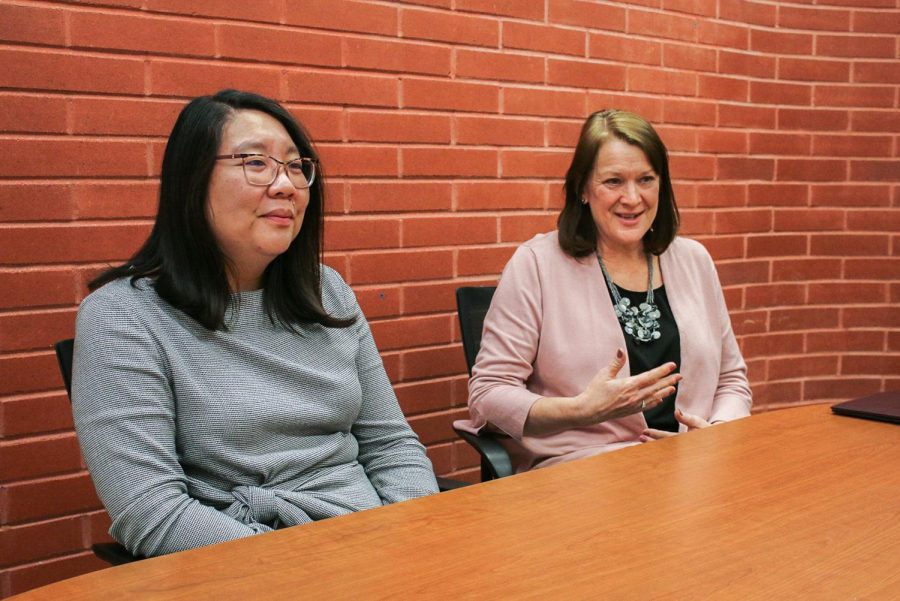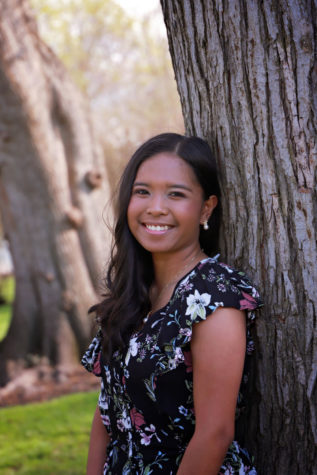New name embodies a new attitude
The network’s new name aspires to reach a broader student body
Associate Dean of Students/Student Care Director Karen Fischer, right, explains how the Student Care Network provides outreach for students during an interview Tuesday afternoon in the Lighty Administration building.
January 23, 2020
WSU’s Office of the Dean of Students recently renamed its Student Care Network to reach more students and share a different story about the network’s purpose.
Jill Creighton, associate vice president of Student Affairs and dean of students/deputy Title IX coordinator, said the Student Care Network is a system-wide Division of Student Affairs initiative. It was previously known as the Aware Network.
She said the Aware Network received many referrals of students who needed support. However, many individuals would wait until they were experiencing a “higher level of concern” before connecting to the program.
Creighton said she heard that people did not know what the threshold was when making referrals to the network.
“What we really wanted to do was make sure that folks know that students can come see us anytime and you can refer a student at any time who needs support or assistance,” Creighton said.
Different factors influenced the name change including wanting people to understand that the program’s focus is on the students. The network’s purpose did not change, but they wanted to apply the right term to the work they were already doing, Creighton said.
“Now that we’re telling the story differently, I’m hoping we’ll see more students [who] realize we’re here,” she said.
The transition was also a part of the WSU system initiative, Creighton said. The Student Care Network staff wanted students to be able to access similar services no matter where they are in the WSU system.
Creighton said the network is available to all WSU campuses through the collaboration of Student Care Teams, which consist of student affairs administrators.
This helps with early intervention, a key aspect of the Student Care Network, she said.
“Early intervention is so key for us to be able to help students because most of the time we can do our best work with students before it’s a crisis or before it’s an emergency,” Creighton said.
Anyone can make referrals of students who might need support, she said. This includes instructors, family members, friends or the students themselves. Referrals and appointment requests can be made on the Student Care Network’s website.
Creighton said individuals can also call the Office of the Dean of Students at (509) 335-5757 or do walk-ins during business hours.
Karen Fischer, associate dean of students and student care director, said the network provides outreach to those who made the referrals and helps them gather information about available resources. The network sometimes does direct outreach to students who need assistance.
Her team consists of student care case managers who work directly with students.
She said the network can help students during medical emergencies. The network can communicate with instructors and inform them that a student will be absent for an undetermined amount of time.
Creighton said the network provides direct services for students. The Office of the Dean of Students has some emergency funding available for students.
The funding can be used to pay rent in order to bridge the gap between homelessness. She said the network also connects students to resources to help with food insecurity and interpersonal violence.
“Our core job is to know what everyone else does and understand the systems and processes that students face so we can help students navigate whatever it is that they’re facing,” Creighton said.
She said the support the network provides is not limited to emergencies or crisis situations. However, she said the network is not an emergency service. Individuals should call 911 if they are in immediate danger to themselves or others.
Creighton said the network’s role is to connect students to resources and help them make the best decisions. The network’s staff wants to empower students to be advocates for themselves and find resilience.
“The goal is for WSU to demonstrate a real ethic of care for our students,” she said. “We’re really hoping that students know that there are people who are rooting for them.”
Fischer said the network’s goal is to share more information about resources to the public to decrease the amount of unknown knowledge students face. She said she has walked with students to food banks to help eliminate barriers students might face when accessing resources.
“Life happens in life,” she said. “A lot of things can happen that people don’t expect … sometimes there are new situations that come into play, emergencies that no one anticipated.”
















